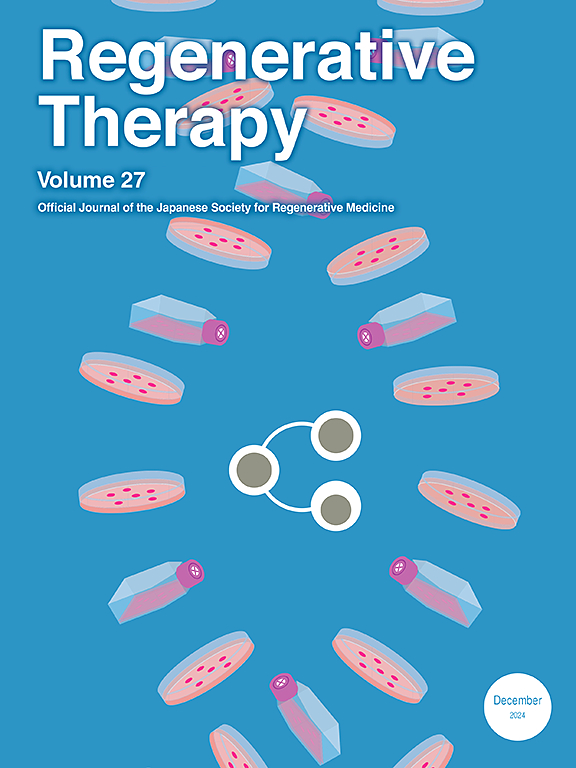在硫代乙酰胺诱导的肝纤维化小鼠模型中,由间充质干细胞和姜黄素设计的细胞外囊泡模拟物能促进纤维化消退
IF 3.4
3区 环境科学与生态学
Q3 CELL & TISSUE ENGINEERING
引用次数: 0
摘要
最近的研究表明,晚期肝纤维化是可以逆转的,但预防肝纤维化所需的治疗药物仍有待阐明。间充质干细胞(MSCs)和间充质干细胞衍生的细胞外囊泡(EVs)对肝纤维化的有益作用已有报道。然而,大规模生产间充质干细胞-细胞外小泡仍具有挑战性。本研究利用硫代乙酰胺诱导的肝纤维化小鼠模型,研究了小鼠间充质干细胞衍生的EV模拟物(MEVMs)与姜黄素(抗纤维化化合物)联合使用的治疗效果。MEVMs是通过连续挤压间充质干细胞制备的。这些 MEVMs 的大小和形态与 EVs 相似。生物分布研究表明,荧光标记的MEVMs主要聚集在肝脏中。胶原蛋白(组织学)、肝纤维化评分、α-平滑肌肌动蛋白(α-SMA)和波形蛋白水平的增加证实了肝纤维化的形成。使用MEVMs、姜黄素或它们的组合治疗可降低肝组织中胶原蛋白的含量,肝纤维化评分进一步证实了MEVMs的抗纤维化作用。所有治疗方法都能降低胶原蛋白 1α、α-SMA 和波形蛋白的表达。MEVMs的效果优于姜黄素。因此,间充质干细胞衍生的EVM可能是治疗肝纤维化的一种潜在替代疗法。本文章由计算机程序翻译,如有差异,请以英文原文为准。
Extracellular vesicle mimetics engineered from mesenchymal stem cells and curcumin promote fibrosis regression in a mouse model of thioacetamide-induced liver fibrosis
Recent research suggests that advanced liver fibrosis could be reversed, but the therapeutic agents needed for the prevention of liver fibrosis remain to be elucidated. The beneficial effects of mesenchymal stem cells (MSCs) and MSC-derived extracellular vesicles (EVs) on liver fibrosis have been reported. However, the large-scale production of MSC-EVs remains challenging. The present study investigated the therapeutic effects of mouse MSC-derived EV mimetics (MEVMs) in combination with curcumin (antifibrotic compound) using a mouse model of thioacetamide-induced liver fibrosis. MEVMs were prepared through the serial extrusion of MSCs. These MEVMs were similar in size and morphology to the EVs. The biodistribution study showed that fluorescently labeled MEVMs predominantly accumulated in the liver. The establishment of liver fibrosis was confirmed via increased collagen (histology), liver fibrosis score, α-smooth muscle actin (α-SMA), and vimentin proteins levels. Treatment with MEVMs, curcumin, or their combination decreased the amount of collagen in liver tissues, with the antifibrotic effects of MEVMs being further confirmed by the liver fibrosis score. All treatments decreased the expression of collagen 1α, α-SMA, and vimentin. MEVMs showed superior effects than curcumin. Thus, MSC-derived EVMs could be a potential alternative for the treatment of liver fibrosis.
求助全文
通过发布文献求助,成功后即可免费获取论文全文。
去求助
来源期刊

Regenerative Therapy
Engineering-Biomedical Engineering
CiteScore
6.00
自引率
2.30%
发文量
106
审稿时长
49 days
期刊介绍:
Regenerative Therapy is the official peer-reviewed online journal of the Japanese Society for Regenerative Medicine.
Regenerative Therapy is a multidisciplinary journal that publishes original articles and reviews of basic research, clinical translation, industrial development, and regulatory issues focusing on stem cell biology, tissue engineering, and regenerative medicine.
 求助内容:
求助内容: 应助结果提醒方式:
应助结果提醒方式:


